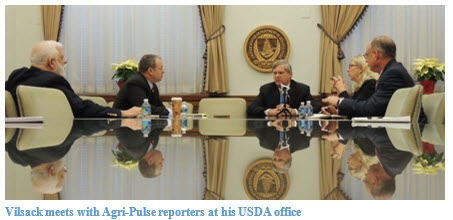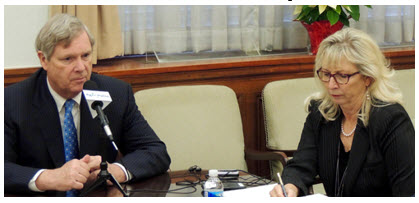WASHINGTON, Dec. 14, 2016 - As he prepares to leave office at the end of this year, Agriculture Secretary Tom Vilsack believes he’s left farm programs and agricultural biotechnology on solid footing, but warns that Donald Trump’s trade policy could boomerang on agriculture.
In a wide-ranging exit interview with Agri-Pulse, he also had some advice for lawmakers when they start writing the next farm bill: Enlist private funding to leverage federal dollars and make them go farther.
He also clearly has one big frustration, that he could never persuade Congress to fund fighting forest fires from emergency spending rather than out of the Forest Service budget. Firefighting costs are not only eating into the Forest Service budget but threatening overall spending levels for the whole department, he says.
In a very personal way that draws on his painful childhood, he also told us how he hopes his eight-year tenure will be remembered. Here are some highlights of our interview:
Vilsack urges Trump to be cautious on China. President-elect Donald Trump has made it clear over the campaign and during the transition that he’s going to take action against China. His transition team at the U.S. Trade Representative is stacked with experts on China and countervailing duty cases. But Vilsack knows that a strong relationship with the Asian giant is extremely important for farmers. China buys about a third of the roughly 4 billion bushels of soybeans produced in the U.S., for example.
“I would just urge caution here in terms of what we say, how we say it and what we do in reference to all our major trading partners, but particularly China, Canada and Mexico because those are our top three,” Vilsack said. “If you end up in a situation where you go over the line, they can easily decide to move away from purchasing from America and look to purchasing products from the EU, from South America … New Zealand, Australia and all over the world.”
Vilsack likes Trump’s decision to name Iowa Gov. Terry Branstad, who has a longstanding relationship with Chinese President Xi Jinping, as his ambassador to China. He says that will go a long way toward strengthening the two countries’ relationship. “I would expect and anticipate that the governor – if confirmed – will be somebody who could potentially bridge further the differences between the two countries and hopefully we’ll see progress,” said Vilsack, himself a former Iowa governor.
On a positive note, Vilsack said China is close to taking
the next steps toward lifting its 13-year ban on U.S. beef as well as agreeing
to reform its process for approving biotech traits. China may have held back in
recent weeks on agreeing to reforms in the last days of the Obama
administration, Vilsack said. “I think
they are cautiously watching what’s going on here in this country” with
the transition to a Trump administration.
The GMO disclosure law should smooth the path for biotech development, according to Vilsack. The secretary took several steps to encourage the development of biotech crops, one being the acceleration of the approval process for new traits. But his biggest achievement probably was in successfully working with Congress to pass legislation to require disclosure of GMO ingredients.
“Assuming it gets implemented the way in which it was intended and assuming it works in the way folks believe it can work, I think there’s going to be less angst about labeling and transparency than there has been. … If we don’t implement it properly, if we continue to have the need to sort of not be transparent, that’s going to create additional hurdles and additional delays in getting the science into the marketplace.”
The law, which the next administration will have to implement, allows companies to do the disclosure through digital QR codes, and it tightly restricts the breeding techniques and food products that are subject to disclosure. The authors intended to exempt from disclosure gene editing and products such as vegetable oil that contain genetic material. Vilsack brought in an outside consultant, Eric Kessler, to work with him and Congress in development of the legislation.
Vilsack says the industry still has to recognize that it needs to interact with consumers about the technology. “Let’s make sure that the conversation is not limited to producers and productivity. Let’s make sure that we bring the consumers into this so that they are fully aware, fully appreciative and are not skeptical or suspicious of the technology.”
Coexistence problem rests with state officials. Vilsack spent his entire eight-year term wrestling with complaints from organic and non-GMO farmers that biotech genes were contaminating their crops and robbing them of profits. Last week, the AC21 committee Vilsack charged with finding a solution to the problem wrapped up its work by releasing documents meant to serve as guides for neighboring farmers to collaborate and compromise with each other.
Vilsack said it will be up to state agriculture departments to ensure that the farmer-to-farmer discussions take place. “You now have within USDA an understanding and respect for all types of agricultural production and that’s a good thing. Now what has to happen is that that conversation needs to be more grass roots.”
 Vilsack: Leveraging
private money for infrastructure could stretch farm bill dollars. Vilsack
has been telling anyone who will listen that he thinks Congress should write
the farm bill according to what level of spending is needed and not be limited
to the allowance, or baseline, permitted under current programs. One way to get
the extra money is to approach investors about taking a financial interest in
USDA’s existing long-term loans in exchange for investing in rural
infrastructure needs, he says. “That’s
a way to meet the need without spending a single additional cent of taxpayer
dollars,” Vilsack said, expressing confidence that investors would jump
at the idea.
Vilsack: Leveraging
private money for infrastructure could stretch farm bill dollars. Vilsack
has been telling anyone who will listen that he thinks Congress should write
the farm bill according to what level of spending is needed and not be limited
to the allowance, or baseline, permitted under current programs. One way to get
the extra money is to approach investors about taking a financial interest in
USDA’s existing long-term loans in exchange for investing in rural
infrastructure needs, he says. “That’s
a way to meet the need without spending a single additional cent of taxpayer
dollars,” Vilsack said, expressing confidence that investors would jump
at the idea.
Crop insurance, farm programs are more ‘defensible.’ Vilsack’s early years in office were marked by a successful battle with the crop insurance industry to slash their administrative and operating (A&O) reimbursement. The Standard Reinsurance Agreement that Vilsack negotiated reduced the A&O reimbursement from 20 percent to 12 percent of total premium. The administration included additional cuts to crop insurance in its annual budget proposals but Congress largely ignored those. And asked if he considers the program still too lucrative, he seemed to say no:
“We’ve made some changes and I think we’ve created a more defensible circumstance. When you had the studies done of the returns that companies were getting compared to what they needed to make sure they were actuarially sound it was pretty clear there was a pretty big delta between what they needed and what they were getting. … It’s in the best interest of the crop insurance industry writ large and for the long term that you have a more defensible situation.”
Likewise, Vilsack says farm programs also are on better political footing with the elimination of direct payments under the 2008 farm bill, replaced by the ARC and PLC programs that are tied to fluctuations in revenue and prices, respectively.
Vilsack’s preferred epitaph: He cared for the kids. When asked how he would like to be remembered, Vilsack said he hoped he would be perceived as someone “who cared deeply about rural America” and someone who tried to raise the awareness of how important rural America is to the rest of the country.
He also said he would like to be remembered as “someone who learned through this job “what an amazing natural resource advantage we have in this country and did what he could to make sure it was preserved for future generations.” But Vilsack also recalled his childhood, as an orphan who never knew his birth mother and then was raised by a woman with substance abuse issues.
“When you have a situation like that, you grow up very, very fast,” he said. “You grow up trying to be a problem solver,” trying to make a sad parent happy, or trying to help when you see a sibling crying. As a result, “I want to make sure that every child that I meet has a childhood, he said. “If that means helping a family with SNAP, so they have a little more on the table,” or providing a school meal for a needy child, “I’m for that,” he said. To put it simply, he said, “I’d like to be remembered as someone who cared for children.”
#30
For more news, go to: www.Agri-Pulse.com

